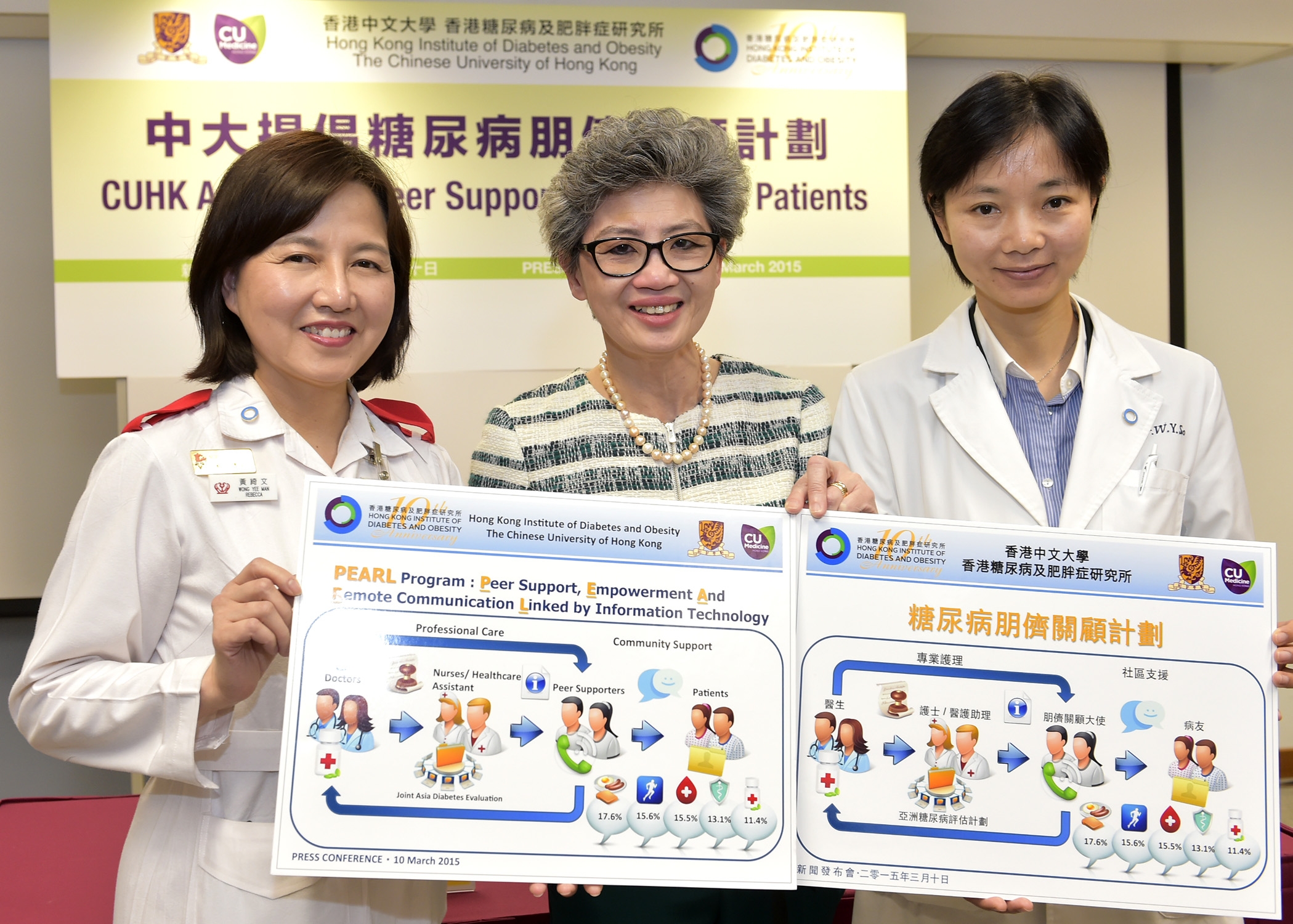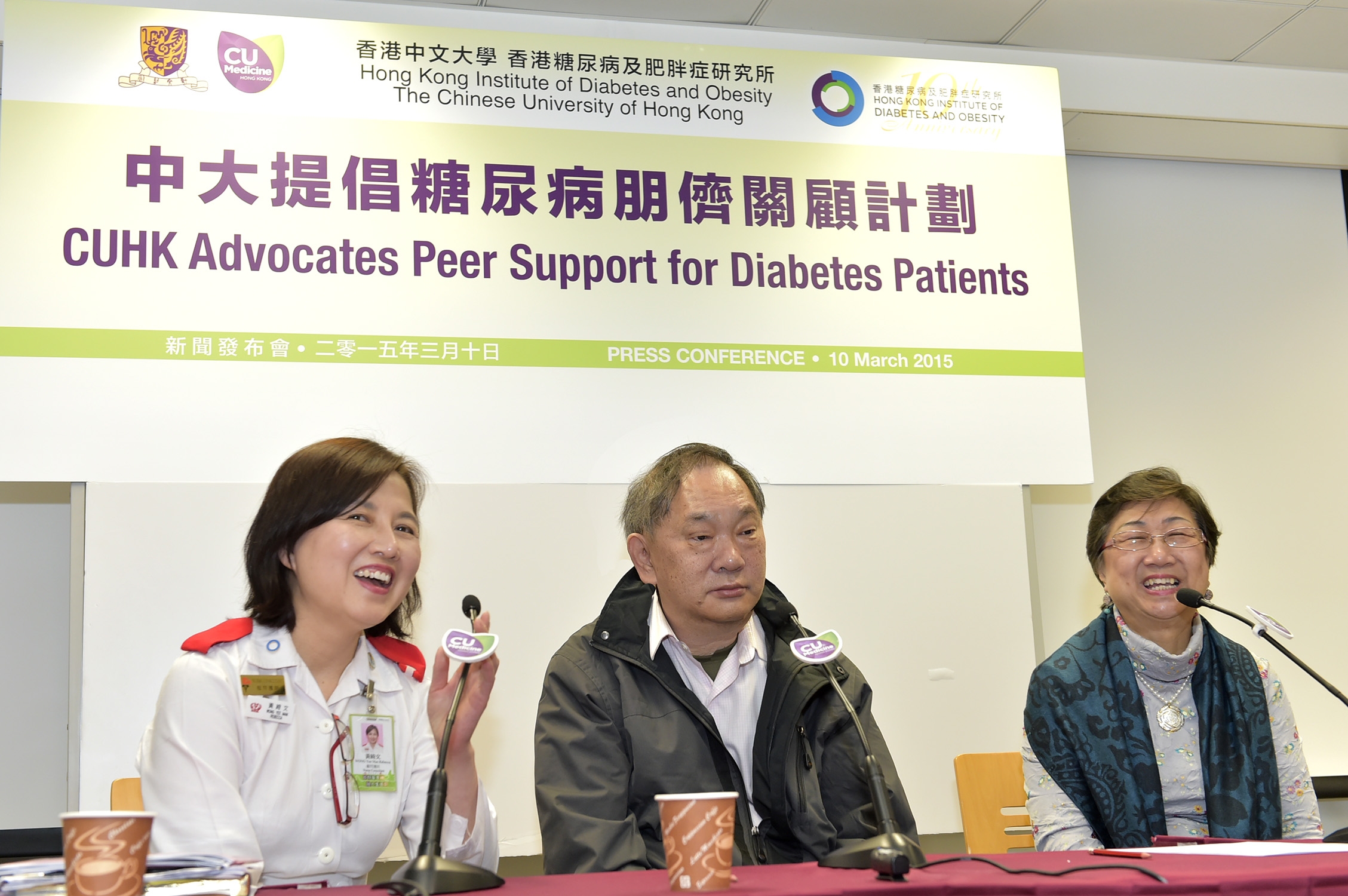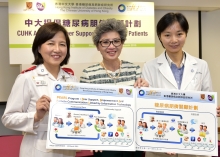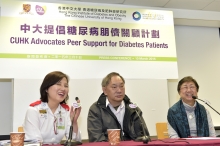CUHK
News Centre
CUHK Study Reveals Peer Support Can Reduce Hospital Admission of Distressed Diabetes Patients
A research conducted by The Chinese University of Hong Kong (CUHK) reveals that peer support for diabetes patients with elevated levels of emotional distress can reduce their hospital admission by 30%. The research finding has been published in the international leading medical journal JAMA Internal Medicine.
On average, a diabetes patient receives about one hour of consultation with doctors from four to six visits in a year, with an average consultation time of 10 minutes per visit. It may not be sufficient for patients to develop their self-care skills and abilities to sustain quality life. Peer support is regarded as one of the most important elements in diabetes self-care. Professor Juliana Chung Ngor CHAN, Chair Professor of Medicine and Therapeutics and Founding Director of Hong Kong Institute of Diabetes and Obesity at CUHK remarked, ‘Peer support empowers patients in four key ways: assisting them in daily diabetes management; providing social and emotional support; serving as a linkage to clinical care; providing ongoing support with lasting impact. All are of great benefits to the patients.’
The Hong Kong Institute of Diabetes and Obesity at CUHK launched the ‘Peer Support, Empowerment, and Remote Communication Linked by Information Technology’ (PEARL) programme since 2009, starting out by training type 2 diabetes patients with stable glycemic control (HbA1c lower than 8%) to be peer supporters. Each peer supporter was grouped with 10 patients to share their own experience regularly. They would contact his or her group members individually with not less than 12 phone calls a year, each lasting at least 15 minutes. Both supporters and members would also take part in structured activities to encourage face-to-face interactions and personal touch. PEARL was selected as the sole research project in Asia to receive a grant of HKD 6.2 million from Peers for Progress, an international renowned peers support organization, to conduct a study on the importance of peer support to the management of type 2 diabetes.
From 2009 to 2010, the diabetes team in the Faculty of Medicine at CUHK randomly selected 628 type 2 diabetes patients from three diabetes centres in the New Territories East Cluster to take part in a 1-year study. All participants joined the ‘Joint Asia Diabetes Evaluation’ (JADE), an electronic diabetes database and online platform providing personalized report and guidance to the patients, while half of them (312 patients) also participated in PEARL at the same time.
‘Benefits of peer support are particularly significant for those 20% of patients with elevated tendency of emotional distress. Hospital admission for distressed patients participating in JADE alone was 48%, whereas the admission for those participating in both JADE and PEARL was 17%.’ said Dr. Wing Yee SO, Clinical Associate Professor (honorary) of Department of Medicine and Therapeutics at CUHK.
The study also showed that 90% of the PEARL members had established close ties with their peer supporters. The median number of calls per pair of supporter and member is 20 per year. The most common topics of their dialogues include diet (17.6%), exercise (15.6%), blood glucose management (15.5%), self-care (13.1%) and use of medicine (11.4%).
Professor CHAN said, ‘Our results of using integrated care augmented by the web-based portal along with peer support for diabetes patients is very encouraging. There are 16 public diabetes centres, many of them have initiated self-help support groups. In the long run, community-based diabetes centres can further enhance the quality of care and promote self management among patients by combining the support from healthcare professionals. This can also help save the overall medical costs.’
The CUHK diabetes team has been engaged in research in diabetes for over 20 years and developed comprehensive structured assessment and peer support programmes. The Hong Kong Institute of Diabetes and Obesity was founded in 2005 and has been providing comprehensive assessment and education services to the community for over 15,000 people through its Yao Chung Kit Diabetes Assessment Centre. Patients are welcome to use the ‘Diabetes Prediction, Diagnosis and Assessment Service’ provided by the Centre so that they can receive proper treatment as soon as possible. For detailed information or to make an appointment, please call the Centre hotline at 2647 8806.
Dr. Wing Yee SO (right), Clinical Associate Professor (honorary) of Department of Medicine and Therapeutics at CUHK, and Prof. Juliana Chung Ngor CHAN (middle), Chair Professor of Medicine and Therapeutics and Founding Director of Hong Kong Institute of Diabetes and Obesity at CUHK, present the study results of the PEARL programmeOn the left is Ms. Rebecca Yee Man WONG, Nurse Consultant (Diabetes) from Diabetes Mellitus and Endocrine Centre at the Prince of Wales Hospital.





